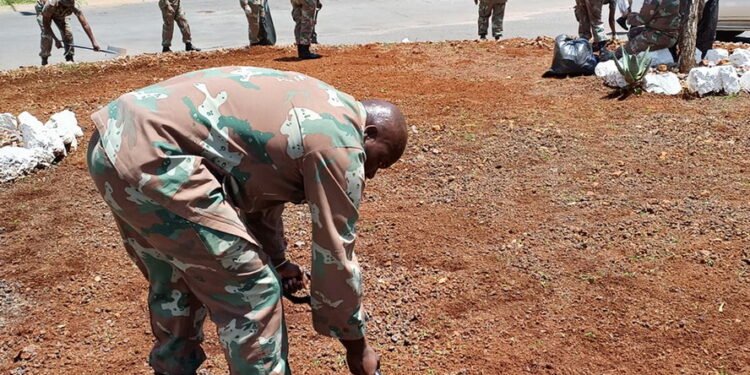
The South African National Defence Force (SANDF) has been tasked with leading the new South African National Service Institute (SANSI), which aims to encourage entrepreneurship and job creation amongst the youth.
Deputy President Paul Mashatile together with the Department of Defence and the Department of Women, Youth, and Persons with Disabilities (DWYPD), unveiled SANSI in Pretoria on 21 May.
The Deputy President said the SANDF-led national youth service is a special project that will be piloted and implemented in the country’s poorest districts, where most youngsters are unemployed.
Despite interventions such as the Presidential Employment Stimulus, which has created over 1.7 million job opportunities, the country’s second-in-command bemoaned that many young people remain on the margins of real economic participation.
He cited the latest Quarterly Labour Force Survey, which shows that the official unemployment rate stands at 32.9%. According to the survey, about 3.6 million (35.5%) out of 10.3 million young people aged between 15 and 24 were not in employment, education or training (NEET).
“I am pleased that the DWYPD, in collaboration with the Department of Defence, adopted a whole-of-government and whole-of-society approach to the skills revolution for the unskilled. This will have a significant impact on restoring livelihoods, creating wealth, and alleviating poverty and hunger among the marginalised.”
According to the Deputy President, the initiative aims to optimise government resources by spearheading impactful projects that assist the nation’s most vulnerable citizens.
“We envisaged inviting and encouraging young people to voluntarily join the National Youth Service, beginning with a character-building programme and progressing to industry demand-based education and training, ultimately leading to gainful employment or entrepreneurship.”
The establishment of SANSI aims to develop, capacitate, and empower young unemployed Technical Vocational Education and Training (TVET) and university graduates through a purposeful and smooth skills-to-industry pipeline that will lead to innovative entrepreneurship and long-term, sustainable employment.
“The initiative also intends to transform youngsters into courageous agents of change, who will tackle the country’s most pressing issues in strategic work streams,” SANews reported. These include food and agricultural value chain commercialisation, maritime and ocean economy, engineering and construction, manufacturing and infrastructure rollouts, as well as skills of the future, which include digital technologies and electronics.
The initiative, Mashatile stated, represents a massive investment in the effort to get young people trained and capacitated to participate in the economy.
“It will empower our young people to contribute meaningfully to the development of our country and the wellbeing of our communities,” he stressed.
The Deputy President announced that the provincial launches are still to follow, with the project aiming to reach at least 100 000 youth participants in the current fiscal year.
He urged all young individuals who meet the eligibility requirements for the NYS to submit their applications in large numbers.
Defence and Military Veterans Minister Thandi Modise described SANSI as a necessary and important initiative and thanked the DWYPD Minister, Dr Nkosazana Dlamini-Zuma, for rallying her to see the bigger picture.
“We see SANSI as that instrument in the hands of the Defence Force that will enable our children to come into their own,” said Modise.
Shifting her focus to the young participants in SANSI, she emphasised that the SANDF will ensure their punctuality, obedience, ability to give and receive instructions, and leadership skills.
“The military will keep an eye on every little cent spent on this project and will go to the future of this country and the skills that we need,” Modise said
Modise at a weekend briefing said the SANDF is part of “a nationally co-ordinated effort to reinforce our nation’s ongoing war of Youth Unemployment through the massification of value chain driven and sector specific skills development, enterprise development, production brigades and infant industries to power up South Africa’s re-industrialisation targets”.
Project Koba-Tlala, which started out as an SA Army Reserve initiative to skill part-time soldiers, will most likely be incorporated into SANSI.
Project Koba-Tlala has its roots – literally – in the provision of fresh produce for military kitchens driven by then Chief Army Reserves, Brigadier General Gerhard Kamffer, seven years ago. He saw it as a way for part-time soldiers to not only become income producing but also to contribute at least some of the fresh produce used daily in military messes. The one-star saw it led by Reserves and his vision was to expand into other service areas such as vehicle maintenance and localised security. Potchefstroom, the unofficial military capital of North West province, was selected as a test site.
Involvement of municipal and provincial authorities as well as academic institutions saw momentum gained with Koba-Tlala spreading to other sites, near military bases and facilities in the Gauteng, KwaZulu-Natal and Western Cape provinces. Marievale military base in Gauteng, home to SA Army elements, saw a thriving vegetable garden established and in Western Cape fresh produce produced under the Koba-Tlala flag made its way to kitchens and messes at Fort Ikapa.
Changes in senior command and responsibilities saw Kamffer become project director for Koba-Tlala in the SA Army Corporate Services Directorate and a June 2022 announcement that it would be the nucleus of a production brigade in General Lawrence Mbatha’s landward force. A presentation to Parliament’s Joint Standing Committee (JSCD) at that time gave a reskilling number of over 1 400 Reserve Force personnel from various musterings with 862 earmarked for skills upgrading in the 2022/23 financial year. The part-time soldiers were shown the ropes on skills as diverse as computer coding through to community development and liaison, agriculture including animal husbandry, water and sanitation, firefighting, first aid and security. These skills would assist them in gainful employment when not in uniform.









